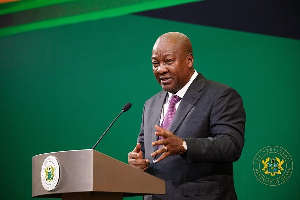Accra, April 2, GNA - Representatives of civil society, the private sector and the media from the Economic Community of West African States (ECOWAS) member-states are meeting in Accra under the auspices of the ECOWAS Commission to fashion out practical ways to stem harassment on the highways and borders within the region.
The three-day meeting which opened on Wednesday, is to mobilize civil society, the private sector and the media to combat harassment on the highways and at the borders because they are the main victims and beneficiaries of the implementation of the ECOWAS protocol on free movement.
Participants would also take a critical look at the ECOWAS Commission's memorandum on the status of the implementation of regional protocols on free movement, right of residence and establishment of citizenship and come up with recommendation to effect those provisions. The memorandum recalled that since the adoption of the ECOWAS protocol relating to free movement, the right of residence and establishment of citizenship on May 29, 1979, individual member-states had perpetually violated its provisions. It noted that those protocols provided for the removal of barriers between member-states to ensure free movement of persons, goods and services, grant community citizenship to nationals of member-states and the right of residence and establishment of enterprises by citizens of member-states.
By extension, the protocols also provided for the abolition of visa requirement for ECOWAS citizens travelling within the sub-region, issuance of ECOWAS passports and travellers' certificate to be recognized by all member-states and the use of ECOWAS Travellers cheques for trading, among other things.
"Despite all these measures, travelling within the ECOWAS sub-region is extremely difficult, on account of the ever-increasing number of illegal barriers and roadblocks, and the extortion of money from travellers at every checkpoint," the memorandum said. It noted that on the basis of the provision of the protocols, the President of the ECOWAS Commission, Dr Mohamed Ibn Chambas appointed an eight-member committee to study the situation at the borders and on the highways and make recommendations regarding the status of implementation of free movement protocols with the sub-region.
The committee observed that with the exception of Burkina Faso, which recently reduced the number of checkpoints considerably, a large number of illegal roadblocks still existed in all the other member-states and systematic racketeering was also rife at such places. The committee noted that, among other things, joint security patrols set up to combat organized crime had been turned into toll stations with security officials from immigration, customs and police extorting money from travellers.
"At some borders, volunteers are recruited by immigration officers to carry out racketeering activities, some borders close at 10 pm whereas they are supposed to be operating round the clock and by that, they give way for criminal activities to be perpetrated," the committee noted.
It also observed that even though all member-countries had ratified the free movement protocols and their supplementary text, immigration officers refused to recognize national identity cards as a valid intra-ECOWAS travel document from sub-regional citizens. The committee also noted that, apart from Benin, Nigeria, Senegal, Guinea, Liberia and Niger, where all the three types of ECOWAS passports, namely the ordinary, service and diplomatic passports have been put into circulation, the other member-states gave excuses that they had a backlog of national passports to issue. The committee therefore identified national authorities (governments), immigration, customs and security service, the private sector and the media and the ECOWAS Commission itself as key stakeholders in the holistic approach to stem harassment and promote free movement as a major factor in the realization of overall regional integrations.
It called on the ECOWAS Commission to lead the way in ensuring public awareness about the rights of free movement for ECOWAS citizens, education for the border security, immigration and customs on free movement protocols, establishment of joint border posts and restructuring of such posts with appropriate facilities to facilitate travelling process.
General News of Wednesday, 2 April 2008
Source: GNA
















